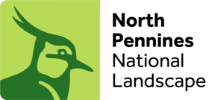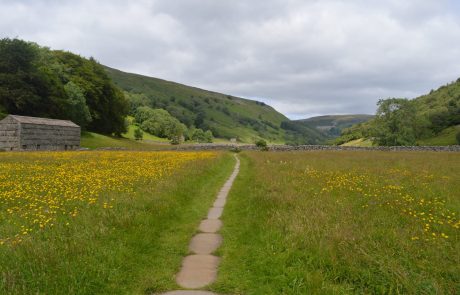News
High Nature Value Farming Awards
Nominations open for High Nature Value Farming Awards
20 July 2023
The North Pennines AONB Partnership and the Yorkshire Dales National Park Authority have opened nominations for a prestigious award for nature-friendly farmers and land managers in Upper Teesdale and Upper Swaledale.
Through Tees-Swale: Naturally Connected, a collaborative programme funded by The National Lottery Heritage Fund, the two organisations are seeking nominations of the best examples of High Nature Value farming.
The High Nature Value Farming Awards aim to recognise and reward examples of the nature-friendly upland farming practices which have sustained the largest expanse of semi-natural habitats in England.
Helen Featherstone, Director, England, North at The National Lottery Heritage Fund, said: “The forward-thinking and collaborative work being done as part of the Tees-Swale: Naturally Connected project, to boost biodiversity, mitigate climate change and connect people to nature, aligns firmly with our key priorities at the Heritage Fund. So, we are incredibly proud to support this new awards programme that will see local farmers and land managers recognised for their contributions and the vital work they’re doing to support a more resilient and nature-rich landscape.”
The principles from Making Space for Nature (the ‘Lawton Report’), of ensuring that more and bigger areas of land are managed with nature in mind, that land is managed more effectively for conservation, and that habitats are more effectively connected across the landscape, are at the core of the Tees-Swale: Naturally Connected project.
British ecologist, Professor Sir John Lawton, is chair of the Tees-Swale project board and also chair of the award’s judging panel. Previously head of Natural Environment Research Council (NERC) and the last chair of the Royal Commission on Environmental Pollution, he led the independent review of England’s wildlife areas, published as ‘Making Space for Nature’ in 2010. Sir John said: “This natural heritage, and the high-nature value farming systems that have sustained it, are under threat in the face of economic pressures and an uncertain future. Their remoteness does not make them immune to the climate and biodiversity crisis, which faces the whole world. If, as a nation, we are to hold on to nature and support its recovery, this is where we must start – and on a transformational scale.”
The awards have three categories with a £500 prize for each:
High Nature Value farming best practice – to recognise farmers and land managers who have continually managed important habitats and species (such as curlew) on their farm and who have integrated sensitive high nature value farming methods into their farming business for many years.
Nature recovery – to recognise farmers and land managers who have carried out work on their holding to create, restore, and expand species-rich habitats.
Public engagement – to recognise farmers and land managers who have created opportunities for the wider public to connect with farming and nature.
Claire Hodgson, programme manager for Tees-Swale: Naturally Connected, said: “We are working with farmers and land managers to put nature at the heart of farming – increasing biodiversity through enhancing the meadows for which Teesdale and Swaledale are famous, creating ‘scrapes’ (small upland ponds) to support wader birds and invertebrates, and restoring peatland to capture carbon. The awards will celebrate these farmers and land managers – the ones who have continually practiced high nature value farming, who are restoring threatened areas, and those sharing what they are doing with the wider public.“.
Farmers or land managers who farm in the Tees-Swale area can be nominated, either by themselves or others, via our website here.
The Tees-Swale area covers Upper Teesdale and Upper Swaledale, see the map here.
The closing date for nominations is Thursday 7 September 2023, 12 noon. Shortlisting and judging will take place over the late summer/early autumn and winners will be announced in late November.
The North Pennines AONB Partnership and the Yorkshire Dales National Park Authority are working in collaboration with farmers and land managers to deliver the £8.5 million Tees-Swale: Naturally Connected programme, predominantly funded by The National Lottery Heritage Fund. Working across 845 km2 of the northern Pennines, Tees-Swale aims to put farming at the heart of nature and nature at the heart of land management.
Media enquiries
For further information and alternative images, contact the communications team at the North Pennines AONB Partnership, email: communications@northpenninesaonb.org.uk or call 01388 528801. Images of Hay timing in Swaledale, June 2018, High Nature Value Farming in Upper Teesdale, June 2014 and Flower-rich hay meadow, Upper Teesdale, June 2011, all ©Rebecca Barrett are attached.
About The National Lottery Heritage Fund
Using money raised by the National Lottery, we inspire, lead and resource the UK’s heritage to create positive and lasting change for people and communities, now and in the future. heritagefund.org.uk Follow @HeritageFundUK on Twitter, Facebook and Instagram and use #NationalLotteryHeritageFund
Since The National Lottery began in 1994, National Lottery players have raised over £43 billion for projects and more than 635,000 grants have been awarded across the UK. More than £30 million raised each week goes to good causes across the UK.
The North Pennines is one of England’s most special places – a peaceful, unspoilt landscape with a rich history and vibrant natural beauty. It was designated as an Area of Outstanding Natural Beauty (AONB) in 1988. The purpose of this nationally recognised designation is the conservation and enhancement of the natural beauty of the area. At almost 2,000 sq. kilometres the North Pennines is the second largest of the 46 AONBs (in England, Wales and Northern Ireland) and is one of the most peaceful and unspoilt places in England. Visit www.landscapesforlife.org.uk for information about the AONB family.
The North Pennines AONB Partnership is an alliance of 24 public, statutory and voluntary sector bodies with an interest in the future of the AONB. The work of the Partnership is carried out by its Staff Unit which takes action to conserve and enhance the natural beauty of the area, to raise awareness of its special qualities and to improve the quality of life for local people.
UNESCO Global Geopark. As well as being an AONB the North Pennines is a UNESCO Global Geopark. This puts the area’s Geopark status in the same UNESCO family as World Heritage Sites and Biosphere Reserves. UNESCO Global Geoparks are places with outstanding geology where special effort is made to make the most of geological heritage to support community and economy. Locally this includes producing geo-trails, developing projects with school and community groups, producing displays for visitor attractions and holding geology festivals and events.
Tees-Swale: naturally connected. The North Pennines AONB Partnership and the Yorkshire Dales National Park Authority are working with partner organisations to deliver a major natural heritage programme that focuses on the landscape and communities of Upper Teesdale and Swaledale, covering 829 square kilometres of Teesdale in the North Pennines Area of Outstanding Natural Beauty and Swaledale in the Yorkshire Dales National Park. Inspired by the report ‘Making Space for Nature’, the programme aims to restore, expand and connect habitats across the uplands of Teesdale and Swaledale, showcasing how public funds can enhance wildlife and deliver multiple public benefits. The ethos of the programme is to work closely and in partnership with farmers, landowners and conservation agencies from the outset. In so doing, we will build the relationships and establish the skills required to sustain our High Nature Value farming systems.
High Nature Value farming is a term used to describe low intensity farming systems that are particularly valuable for wildlife, the environment and people. The concept of knowledge exchange will be a core principle of the programme, with farmers encouraged to share their land management skills and experience in order to target habitat improvement and restoration, in a way that allows the whole farm to work as a system.
The Yorkshire Dales National Park is one of 15 National Parks in the UK. It is administered by the Yorkshire Dales National Park Authority, which has two main purposes: “to conserve and enhance the natural beauty, wildlife and cultural heritage” and “to promote opportunities for the understanding and enjoyment of the special qualities of the National Park”. In carrying out these purposes, the Authority has a duty “to seek to foster the economic and social wellbeing of local communities”. The National Park Authority comprises 25 members, made up of county and district councillors and members appointed by the Secretary of State for the Environment to represent parishes or in recognition of their specialist skills or knowledge.
All of our work is guided by the vision for the future of the National Park set out in the Yorkshire Dales National Park Management Plan: “Through their passion for this special place, local people and businesses will keep the Yorkshire Dales National Park a thriving area. Its unique cultural landscape will be treasured for its stunning scenery, exceptional heritage and wonderful wildlife, and every year millions of people will be inspired to be a part of it.” www.yorkshiredalesmanagementplan.org.uk










